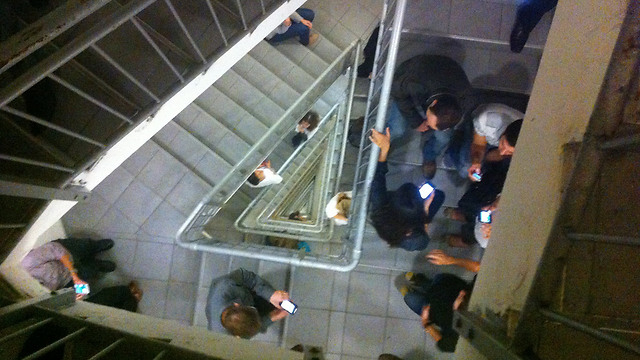 Iranian missile test. A number of tough days (Photo: AP) At first we’ll experience a number of tough days. Rockets and missiles, directed mainly at the Tel Aviv metropolitan area. The aerial defense will mostly defend strategic facilities and bases, in the big cities buildings will collapse and there will be casualties.
Iranian missile test. A number of tough days (Photo: AP) At first we’ll experience a number of tough days. Rockets and missiles, directed mainly at the Tel Aviv metropolitan area. The aerial defense will mostly defend strategic facilities and bases, in the big cities buildings will collapse and there will be casualties.
But it won’t last for long. The Israel Air Force will respond immediately, and after a few days we will see a significant drop in the number of missiles fired on Israel. A ceasefire will follow, there will be some more rocket fire, and then a truce and relative calm for several years thanks to the restored deterrence.
This is the serious but reasonable scenario the IDF is preparing for, and this is the political echelon’s strategic target. It will be a “high-trajectory war.” Whether the rocket fire comes from Syria, Lebanon, Gaza or Iran – the goal will to end it quickly in order to minimize damages and losses, while causing maximum damage on the other side, so that it feels the urgency to pursue a ceasefire.

Israelis running into bomb shelters. Buildings will collapse (Photo: Idan Rodkin)
Israel Air Force (IAF) Commander Major-General Amir Eshel and senior IAF officers believe it is possible – and even more: With the intelligence, the arms and aircraft available at the Air Force’s disposal, they believe it could reach the described achievements on its own, without the IDF having to maneuver its way into enemy territory, and it must be allowed to do so.
If Major-General Eshel and his people are right, we are talking about a significant reduction in the number of casualties and a huge saving in resources considering the astronomic cost – about NIS 1 billion ($290 million) – of every day of fighting. What the IAF commander is suggesting is in fact a real revolution in the IDF’s combat perception, which will dramatically affect the need to equip and train the ground forces, and the budgetary list of priorities.
I already heard the claim that the Air Force can do the job on its own once before from Dan Halutz, when he served as IAF commander before being appointed chief of staff. That claim was proven wrong in the Second Lebanon War, and that’s the reason it still raises many doubts today.
Of course not all senior IDF officers agree with the IAF’s assessments. Many generals, who are aware of the Air Force’s abilities and respect them, still believe that the army must operate on the ground in order to paralyze the firing of thousands of rockets and missiles.
The short period of action is also seen as unlikely. The IAF officials respond with quite a convincing argument: If we are attacked suddenly, it will anyway take us time to gather all the ground forces and overcome attacks on emergency depots and traffic arteries. At the same time, we will have an opportunity to get the job done through aerial attacks. Simultaneously, they say, we are preparing to offer the ground forces significant help in the fighting.



Fulfilled Biblical prophecy leads to the surety of Israel being the victorious winner in the end. Though Israel has superb military strength, like all Biblical prophecies were ultimately fulfilled through the power of God, and Israel’s becoming the winner will only again be through the power of God. Even though that is true it is great to read of Israel’s fighting capabilities. Similar to reading about King David’s mighty men in the Bible.
It is tragic that some people in high positions, after the second Lebanese war debacle, still formulate the aims of war in such unclear and indecisive terms.
There is one legitimate aim of war: to win. To vanquish the enemy. The shortest way to do this is to kill the enemy leadership in a dramatic strike, and threaten to do more and terrible damage within hours unless total unconditional surrender is signed by the leaders of the enemy military.
the end goal of reaching a cease fire is not good. One rarely achieves more than the goal that they aim for. Maximum damage on the other side should be the goal and this damage should be utterly devastating causing disruption to their cities and lives for years to come. In such a scenario they may turn on their own leaders. Unless they suffer immensely the same repetitive scenario will likely ensue. I note that Assad has not worried as he bombs civilians in cities. Whatever happened to the goal of maximum liquidation of the enemy?
There is a much quicker way to do this:
a) Have northern Israel go into fallout shelters.
b) Drop a series of four or five 10kt tactical nukes on Southern Lebanon.
War over in one hour.
Next?